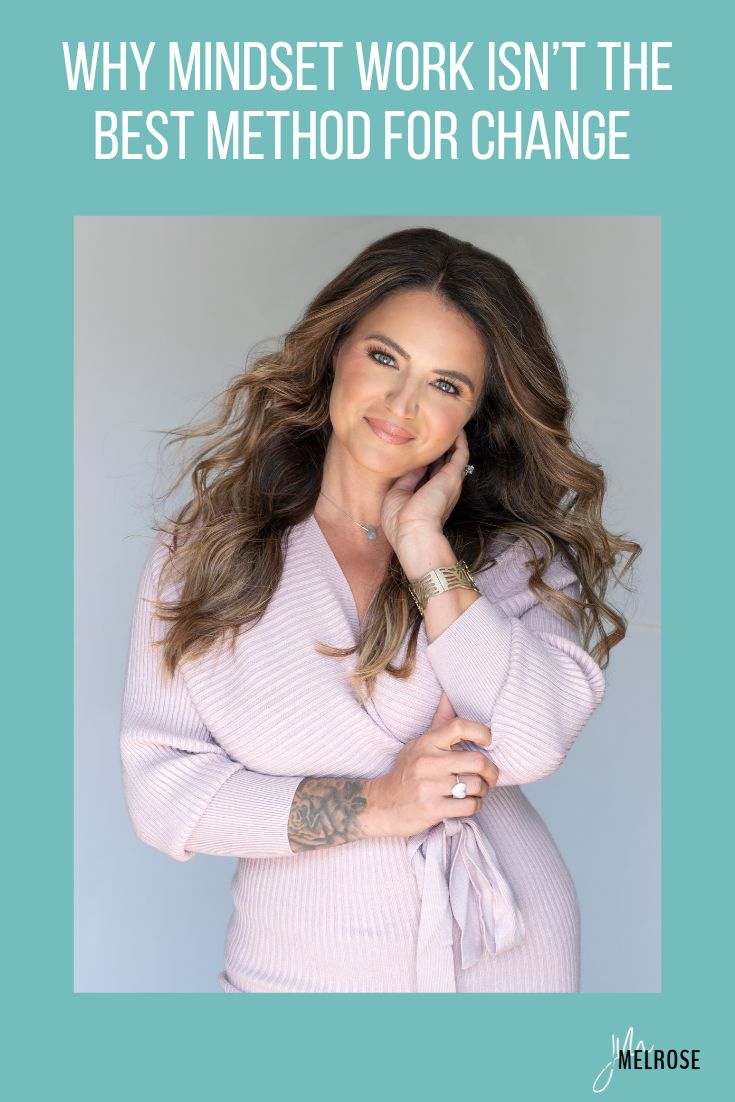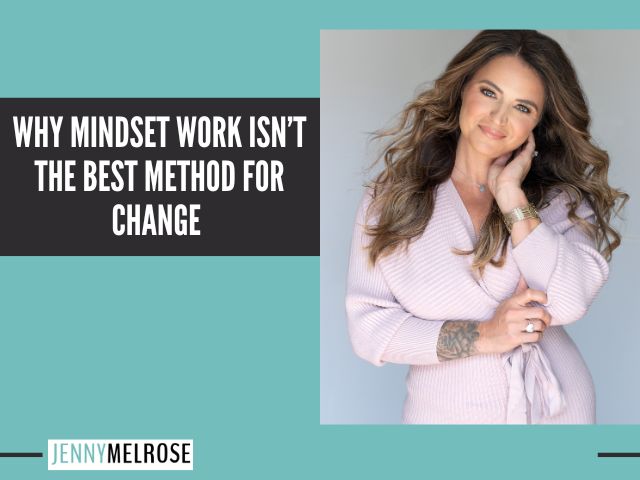Ever wonder why your mindset work isn’t making a difference in your personal or business growth? In this authentic conversation, Chrystal Rose tells why and explains the best method for change.
IE 399: Why Mindset Work isn’t the Best Method for Change with Chrystal Rose

Chrystal Rose is a transformative coach and performance coach for entrepreneurs. She helps high-level women in all areas of life become better versions of themselves by achieving the stuff they want to achieve and leaving the things that are holding them back behind.
She believes that our lives affect our business and business affects our life.
What are the limitations of mindset work when it comes to facilitating real change in individuals?
Mindset work is working with your conscious mind. Many people know that 95% of our beliefs and things we do come from our subconscious mind. We are only aware of and use 5-15% of our brain consciously.
Most of the things that have happened to us and our thoughts have created behaviors and programs inside of our brains. When we do mindset work on a program that has been running for a long time, we are only hitting the surface level and not getting to the root.
This feels like work because we don’t always realize that things are naturally happening and we need to figure out how to impact that.
Can you explain the difference between mindset work and other approaches to personal development or behavior change?
There are many modalities out there but Chrystal mainly focuses on embodiment work (through the body) and unconscious reprogramming work (speaking to your subconscious).
With mindset work, you are working in the conscious realm and babysitting your thoughts all day. You need to make sure you don’t think certain thoughts or focus on doing certain things. You catch yourself doing things you may not want to do. You are constantly holding on tight.
With embodiment work, you go through the body, which is a back door to the unconscious, to find beliefs, wounds, and trauma in the body. With conscious reprogramming, you are speaking to the program that is running as if you are closing a tab on the computer.
If you have 50 tabs open, they are all running in the background. You are getting to the root of the symptom and closing the tab.
What are some of the questions you might ask in embodiment work to figure out where someone is storing one of these programs?
When you have a behavior or negative thought, there is a sensation or feeling attached to it. Perhaps the behavior is being perfectionistic, self-sabotaging, or being an inner critic. There is something that you feel in your body when that happens.
Chrystal asks a series of questions, depending on the person:
- How old is it or how old do you think it is?
- What does it feel like?
- If it were saying something to you, what would that be?
Sometimes, a memory will come along with it and you can figure out where the thought or behavior came from.
Jenny mentioned that she tends to be a perfectionist and she can feel the tension in her shoulders, which tense up immediately. When Chrystal mentioned going back to when she first felt that, Jenny knew that she was about middle school and she was cut from a team.
From that point on she felt like she always had to practice to get better and she was very hard on herself because of it. While Jenny understands what happened there, she also appreciates that the experience helped shape who she is now. She doesn’t see her perfectionism as stopping her with anything as she will push past it if needed.
Chrystal explained to Jenny that perfectionism starts to become an identity. People say, “I’m a perfectionist.” In reality, perfectionism is a coping mechanism.
While you are trying to move in the direction you want to move, perfectionism gets in the way. While perfectionism isn’t necessarily stopping you, it requires effort and energy to push through and that is why Jenny feels the tension in her body. Being a perfectionist isn’t who Jenny is.
When she started this in middle school, she may have needed it to keep her safe and loved. She needed it at the time. We tend to take on perfectionistic behaviors because we think if we are perfect, we will be loved or safe.
That is a program that is running, even if you know you are loved. You may know that you don’t have to do things to receive love from the people who already love you but there is an unconscious feeling that you have to do everything right to be loved.
How does mindset work sometimes oversimplify complex issues or challenges?
Let’s say you have a negative thought that you don’t want to be thinking about. You know it is not helpful and doesn’t serve you.
Negative thoughts are like weeds in your garden. In mindset work, you just plant more flowers. You cannot see the weeds but they are still there. The flowers are pretty but the weeds are still underneath and keep coming, even though you have gotten used to pushing them down.
You may not even notice anymore but it takes a lot of conditioning to keep them at bay. If you are not paying attention or something big happens, all of the mindset work just disappears.
This is why so many people feel like they have backslid. They have been holding so tightly to the mindset that it is just a bunch of flowers covering what is underneath. You need to remove the weeds with reprogramming.
What role do societal or systemic factors play in influencing individual mindsets, and how does this impact the effectiveness of mindset work?
One example is that we are conditioned around our bodies and food. Another example is that women compete with each other.
We all are born with different sets of challenges. Someone who is born into abuse and trauma will have a different experience than someone who has a different color skin. It may not be harder for one over the other but they are just different experiences that we have to overcome.
It is what makes us so beautiful. Two people have to overcome the same thing but experience it differently and learn different coping mechanisms as a result.
Chrystal’s clients are all unique and she keeps adding things to her toolbox because the same things do not work for everyone. Yet, we are all the same with our computer programming and our mind.
Unraveling the different experiences is similar for everyone. Chrystal doesn’t even need her clients to tell them the trauma they have gone through to be able to help them unravel the experience because she can lead them through the process that works for everyone.
In society, we are conditioned in so many ways, especially in different areas. For example, as an entrepreneur, we are conditioned to “just keep going,” never stop, and work hard.
We hear that if we work a million hours now, we can have the life we want later. This is propaganda associated with being an entrepreneur.
The hustle culture that we go through trains us that we have to continue to push down that path and it sometimes makes things worse, leads to burnout, or causes imposter syndrome or comparison. These things can hinder us in business as we continue to grow.
There is also the “anti-hustle” culture which tells us not to do anything and only work two hours a week. Those who are working their butts off are trying to figure out how to do that.
Chrystal takes a middle-of-the-road approach because she works very hard but she doesn’t overwork or burn out. She has a full life outside of work. You can be ambitious and have balance. Some business owners enjoy what they are doing and see that as their life. You still have to have relationships with your family and friends.
How can you have enjoyment and a full life outside of your business?
It is very easy to tell people to get a hobby or not to work too many hours. Again, that is just mindset work. It is like telling someone with depression just to be happy.
The first step is to expand your capacity. So many entrepreneurs are at their maximum capacity and they have no space to add anything to their lives. Chrystal helps people expand their emotional capacity first.
You can still be doing all of the things you are doing but it feels effortless.
Chrystal was at a point in her life when she felt overwhelmed, burnt out, and wanted to crawl under a rock. She was tapped out and had no life outside of work.
Then, she expanded her capacity by cleaning up her energy leaks and stopping the things that she felt obligated to do or that she hated. She started doing more energy-giving things and things that brought her life. She regulated her nervous system.
Now she spends less time working and is way more productive. She has many things outside of work that she loves, like reading fiction. She has more space for the people she loves and also work.
Jenny appreciated that Chrystal didn’t use the word boundary, although that is what boundaries do. Instead of limiting yourself, you get energy by giving energy. Chrystal never tells her entrepreneur clients to quit working. She just helps them make tweaks that make space in their life.
You can do more. You just have to change the way you do things. Many entrepreneurs find that the best time for their ideas is when they take a break and their brain is not being distracted.
Embodied Baddie: 3 Day Shift
This is a way to improve your emotional state in 5 minutes or less. It is 3 days of trying a few things so you can notice how powerful a few tiny things can be.
From her website: It is a unique blend of embodiment & unconscious work that gets you FAST results, and lasting change. Using your body as a healing tool, your subconscious mind is completely reprogrammed…allowing you to leave behind the ingrained behaviors and patterns that don’t serve you.
It is delivered on private podcast audio so you can listen while you do other things.
You can get the Embodied Baddie: 3 Day Shift here.
ACTION ITEMS
- If you liked this episode of Influencer Entrepreneurs, please subscribe and leave a fabulous review!
- Ready to go deeper into your business? Join the Insiders Group at the special rate for podcast listeners.


